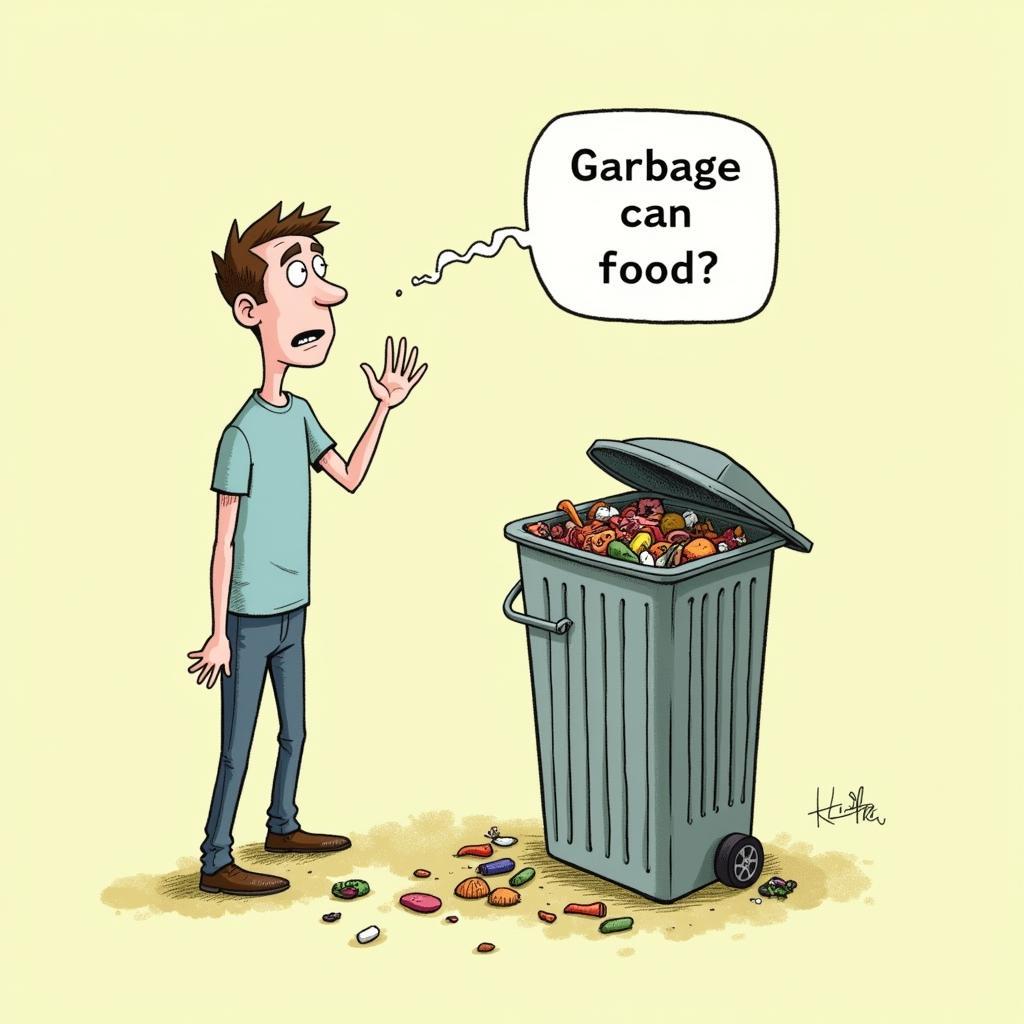Garbage Can Food. The term itself conjures up images of discarded leftovers and questionable cuisine. But what exactly is it? Is it a culinary trend, a survival strategy, or something else entirely? This article dives deep into the world of garbage can food, exploring its various meanings, implications, and even some surprisingly delicious variations.
 Common Misconceptions About Garbage Can Food
Common Misconceptions About Garbage Can Food
What Does “Garbage Can Food” Really Mean?
The term “garbage can food” can be interpreted in a few different ways. Most commonly, it refers to a dish called the “Garbage Plate,” a Rochester, New York specialty. This iconic dish is a piled-high platter of comfort food favorites, often including cheeseburgers, home fries, macaroni salad, baked beans, and meat hot sauce. While the name might sound unappetizing, the Garbage Plate is a local favorite and a testament to the beauty of simple, satisfying food. Another interpretation refers to food that is literally retrieved from garbage cans, often due to economic hardship or as part of the “freegan” lifestyle, which seeks to minimize waste and consumerism. Finally, it can also be used colloquially to describe any food that is perceived as unappetizing or of poor quality. Let’s explore these different interpretations in more detail.
The Rochester Garbage Plate: A Culinary Icon
The Garbage Plate, originating from Nick Tahou Hots in Rochester, has become a cultural phenomenon. It’s a celebration of excess, a comforting mix of textures and flavors that has captivated generations. While the specific ingredients can vary, the core concept remains the same: a hearty, no-frills meal that’s perfect for late-night cravings or satisfying a serious hunger. If you’re ever in Rochester, experiencing this unique culinary creation is a must.
Did you know that there are countless variations of the Garbage Plate, each with its own unique twist? Some include Italian sausage, chicken tenders, or even fish fry.
Garbage Can Food and Food Waste: A Serious Issue
On a more serious note, the term “garbage can food” also highlights the issue of food waste. Millions of tons of perfectly edible food are thrown away each year, while many people struggle to access nutritious meals. The practice of dumpster diving, or retrieving discarded food from garbage cans, is a controversial but often necessary survival tactic for some individuals. Organizations like food banks and community kitchens play a crucial role in addressing this issue by redistributing surplus food to those in need.
Dumpster Diving and the Freegan Lifestyle
The freegan lifestyle, characterized by minimal consumption and a reliance on salvaged goods, including food, represents another facet of “garbage can food.” Freegans often retrieve discarded food from dumpsters, arguing that much of it is still perfectly edible and that consuming it helps reduce waste. However, this practice is not without its risks, as discarded food can be contaminated or spoiled.
What are some safe practices for dumpster diving if you are considering this lifestyle? Researching local regulations, inspecting food carefully, and avoiding perishable items are crucial for minimizing potential health risks.
Garbage Can Food: A Metaphor for Unhealthy Eating?
Finally, the term “garbage can food” can be used metaphorically to describe food that is perceived as unhealthy, processed, or lacking in nutritional value. Think heavily processed snacks, fast food, and sugary drinks. While these foods may be convenient and appealing, they often contribute to health problems and are best consumed in moderation.
Conclusion: Rethinking Garbage Can Food
From the iconic Rochester Garbage Plate to the serious issue of food waste, “garbage can food” encompasses a wide range of meanings and implications. Understanding these different perspectives helps us appreciate the complexities of our food system and the importance of making informed choices about what we eat. Remember, what might be considered “garbage” to some can be a treasured meal to others. By exploring these diverse interpretations, we can gain valuable insights into our relationship with food and its impact on our communities and the environment.
FAQs about Garbage Can Food
- What exactly is in a Garbage Plate?
- Is dumpster diving legal?
- How can I reduce food waste at home?
- What are the health risks associated with dumpster diving?
- Are there any healthy versions of the Garbage Plate?
- Where can I try an authentic Garbage Plate?
- What are some other regional food specialties with unusual names?
Are you intrigued by unusual food names? You might find our articles on construction party food labels and racoon bait food equally fascinating. Perhaps you’re dealing with a pet’s digestive issues? Our post on dog vomiting white foam and food may be helpful. For those curious about peculiar food-related observations, we also have an article on ants but no food. Lastly, If you’re interested in exploring different culinary options, you can check out our big black food truck menu.
Need assistance with garbage can food or any other food-related queries? Contact us at Phone Number: 02437655121, Email: minacones@gmail.com Or visit us at: 3PGH+8R9, ĐT70A, thôn Trung, Bắc Từ Liêm, Hà Nội, Việt Nam. We have a 24/7 customer service team ready to help.